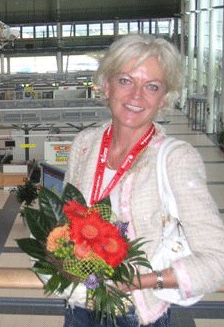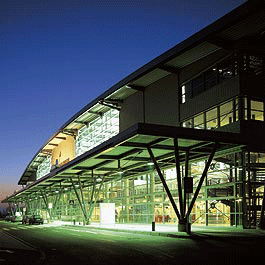ACI
FIATA TIACA Bid Liberalized Cargo


 Left
to Right—Robert J. Aaronson, Jack Boisen and Issa Baluch Left
to Right—Robert J. Aaronson, Jack Boisen and Issa Baluch
Next week as the 36th International Civil Aviation
Organization (ICAO) Assembly convenes, some 180 contracting states, various
agencies and other observers will gather to discuss aviation issues.
The ICAO Assembly 36th Session is held at ICAO Headquarters in Montréal,
Canada from September 18-28 and during that time a virtual blizzard of
information will come forth.
This year in a move reminiscent of “The
Three Tenors”, Airports Council International (ACI)'s, Robert J.
Aaronson, The International Air Cargo Association (TIACA)'s Jack Boisen,
and the International Federation of Freight Forwarders’ Associations
(FIATA)'s Issa Baluch will deliver a presentation to ICAO.
Among other things the landmark effort will include
for the first time a coordinated call advocating cargo liberalization.
That move has been a recurring theme for ACI and others for quite some
time.
For the record ACI submitted a similar paper
at the ICAO Global Air Transport Conference in 2003.
Also worth noting is that some of these
recommendations were incorporated in a presentation by Emirates SkyCargo’s
Ram Menen last week at Air Freight Asia in Hong Kong that was presented
here exclusively last issue on September 11.
 
Flughafen Rostock Laage is an example
of a well built and
geographically positioned airport near Berlin Germany that could
benefit from air cargo liberalization.
"We are ready, willing and able to do business,"
says airport managing director Maria Muller.
m.muller@rostock-airport.de
|
The extraordinary step of
ACI teaming with trade organizations such as FIATA and TIACA may help
lend some credence to an ongoing industry claim strongly felt by air cargo
professionals around the world, that the time is long past for the industry
to be considered in a proper 21st century light by governments everywhere.
Here is a preview of next week's presentation:
Air cargo is a dynamic force
in the interdependent global economy because of its vital role in underpinning
global trade and the global supply chain.
Air cargo traffic rights should be liberalized
to take account of the imperative for speedy delivery times and should
be separated from passenger rights, since they involve different markets
and different issues. Cargo’s pivotal role in the global economy
is best served by fully liberalized market access, a step already taken
by several States.
ACI, FIATA and TIACA support the liberalization
of air cargo and express services for unfettered market access. The three
organizations strongly believe that the global air cargo marketplace should
be unrestricted as to the ability of air carriers to move cargo in any
international market between two points anywhere in the world.
The three organizations are in favor of
liberalizing international traffic rights for all air charter, combination
carriers and all-cargo carriers, and allowing buyers and users the opportunity
and responsibility to determine their carrier of choice in the marketplace.
Setting air cargo free in this way allows
market mechanisms to work across economies for the benefit of global trade.
The present state and pace of air cargo liberalization denies users, industry
participants, and States the benefits of full global trade.
The framers of the Chicago Convention could
not have conceived of the fundamental importance of air cargo today for
so many users and consumers around the globe.
Air cargo and express transportation is
an economic development tool and driver of economic growth for the global
economy; where liberalized all-cargo transportation traffic rights are
available, separate all-cargo agreements should be pursued as the first
step towards market liberalization and openness.
Often developing countries see the advantages
of market openness for the movement of goods before they recognize the
same advantages on the passenger side.
Such openness should be balanced and should
be enhanced strictly for economic reasons.
Where efforts to separate all-cargo operating
rights from combination rights, including passenger service, are deemed
to be more practical, such agreements should not be held back by restrictions
brought about by countries in an effort to protect carriers’ ambitions
on the passenger side.
Cargo liberalization entails a shift in
current regulation by proposing an agreement between like-minded countries
that support the principle of severance of cargo from passenger rights,
as an initial step in a long-term strategy.
Under this approach, a new generic all-cargo
agreement would grant the same rights and privileges, on a reciprocal
basis, to all signatories.
Such liberalization for all-cargo rights,
however, should in no way restrict the ability of combination carriers
to obtain similar agreement rights for both passenger and cargo service.
There are circumstances where, politically,
the granting of such all-cargo rights must be taken in parallel with combination
carrier openness.
It is understood that there is the possible
need to exclude cabotage from this particular instrument.
The establishment of a multilateral group
of countries permitting fifth, sixth, and seventh freedoms can be confidently
expected from countries that already operate “Open Skies”
agreements.
There are widely varying estimates of the
financial impact of the air cargo industry.
Most analysts quote a figure of 30% to 40%
as the amount of world trade that moves by air in value terms. Using the
range this puts the value of all shipments carried by air at between US$
2.5 and 3.5 trillion, by any measure an impressive number.
As more and more nations join the World
Trade Organization, tariffs will decline and more goods will move by air.
Almost all forecasters see at least 6 percent
annual global growth for air cargo tonnage over the next 20 years.
Outmoded bilateral agreements, which always
have treated air cargo market access as a subset of passenger traffic,
slow the logistics supply chain or cause the chain to operate over circuitous
routings, adding precious time to the shipping process.
Only a few countries (India the most prominent)
have embraced the logic that all-cargo services should be treated separately
from passenger traffic and have moved to create liberalized regimes for
cargo, including in some cases unilateral rights for seventh freedom traffic.
Those countries, which have made the move
to electronic pre-clearance and paperless processing of shipments, are
at a competitive advantage in a business where time is money.
The air cargo industry is already enabling
the rapid integration of the world economy, bringing efficiencies to complex
production processes by moving intermediate goods to regions, which add
the highest value at the lowest cost.
Air cargo also carries high value finished
goods quickly from manufacturer to consumer, cutting inventory costs and
driving high levels of customer satisfaction.
The future of the industry depends to a
large extent on governments recognizing that market forces should continue
to drive innovation.
Excessive regulation has a high cost, creating
inefficiencies in the global supply chain and thereby reducing the positive
economic impact of air cargo on the economy.
Geoffrey Arend
|



